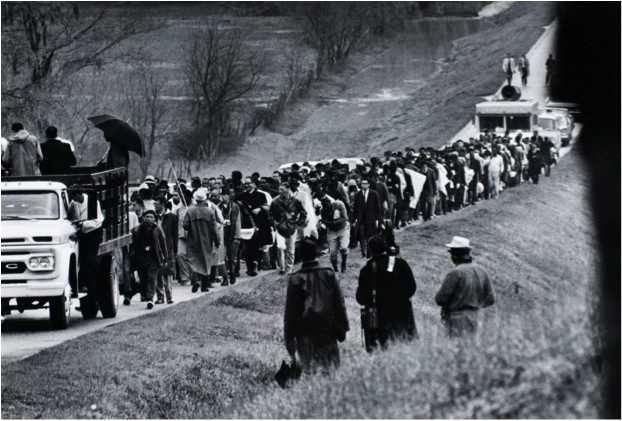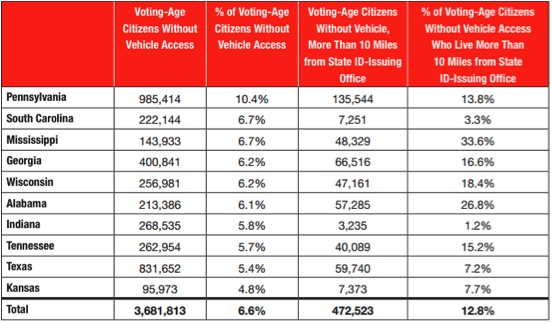
Sustainable transportation advocates may read news headlines about new voter ID laws, roll their eyes at the prejudices of red-state legislators, and turn the page -- at their own peril. This seemingly unrelated issue may have far-reaching consequences for transportation policy. New state laws mandating photo ID for voters threaten to disenfranchise nondrivers, and the skewed elections that would result could lead to political control by forces hostile to transit, cities, and even Safe Routes to Schools.
A report issued in early July by the Brennan Center for Justice at New York University School of Law [PDF] spells out how the strictest new laws in ten states* discriminate against nondrivers.
The first, and most obvious, way is that drivers have a driver’s license, which can function as the required photo ID. That leaves nondrivers as prime targets of voter ID laws.
Eleven percent of eligible voters lack the necessary ID, and, as the table above illustrates, nearly half a million people in the 10 affected states both lack access to a vehicle and live more than 10 miles from the nearest ID-issuing government office.
To make matters worse, many of the same states now requiring photo ID for voting also fail to support transit. The report brings home the reality for the targeted voters:
Voter ID laws are especially burdensome for citizens in high-poverty areas. Not only are these eligible voters among the least likely to have photo ID, they are also among the least likely to have access to government services, such as public transportation… Citizens with limited vehicle access will be highly dependent on public transportation to obtain the ID necessary for voting. However, the states that passed the most restrictive voter ID laws are among the nation’s worst investors in public transportation… Seven of the ten restrictive voter ID states rank in the bottom half of the country when it comes to investment in public transportation.
The state with the highest per capita investment in transit in the nation is New York at $224.85. Of the 10 voter ID states, Pennsylvania spends the most ($94.77), then the amount drops off sharply to Wisconsin at $22.31, a tenth of New York’s spending. Indiana is next at $8.63. The miserable amounts diminish from there until the list reaches Alabama, which provides no state funding for transit at all. Mississippi and Georgia spend less than a dollar.
Getting a valid ID is made even harder because many issuing offices are open only a few days a week -- or less. In Sauk City, Wisconsin, the office is open only on the fifth Wednesday of the month, but eight months in 2012 have only four Wednesdays.
Rural areas will be hit hardest by the new requirements, but even residents of cities will have a hard time obtaining the proper ID. Much as jobs have migrated to the suburbs, leaving nondrivers unable to search for work outside the range of transit, the government offices issuing voter ID are often located outside the downtowns where most of the affected citizens live. The report describes the situation in Knoxville, Tennessee:
The nearest ID-issuing office is 11 miles east of the city center, which is home to the city’s largest concentration of black voters. There are 61,600 eligible voters in downtown Knoxville who live more than five miles from that ID-issuing office; 26 percent of them are black, and 27.5 percent live in poverty. The office is not served by the city’s public bus system. This could pose a particular challenge for the 7,000 eligible voters living downtown who do not have a car.
The implications are clear: If you don’t drive, you become a second-class citizen. Sustainable transportation advocates in progressive cities may find it hard to believe that anyone in 2012 could lack a photo ID -- and all too easy to ignore the plight of the South Carolinian born at home, lacking a birth certificate, and still living out in the country.
There are more people in that situation than you might think. Plenty of people don’t drive, don’t have photo ID, and don’t have the money to jump through all the hoops put before them. In Mississippi, according to the Brennan Report, “To secure government-issued photo ID, many voters will need a birth certificate. Yet the state requires a government-issued photo ID to obtain a certified copy of a birth certificate.” Where do you begin?
The people who are trying to suppress voting are the very ones slashing funds for transit and bike/ped improvements. Voters being disenfranchised overlap substantially with transit users and walkers, not with purveyors of sprawl and legislators slashing transportation funding. The connections are clear.
* The 10 states with the strictest new laws restricting the right to vote are: Alabama, Georgia, Indiana, Kansas, Mississippi, Pennsylvania, South Carolina, Tennessee, Texas, and Wisconsin. Seven other states have passed laws requiring photo ID for voters, and 16 more require some form of identification. These 10 are just the strictest.






